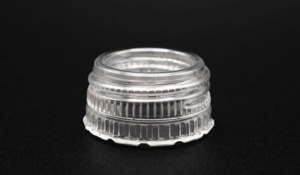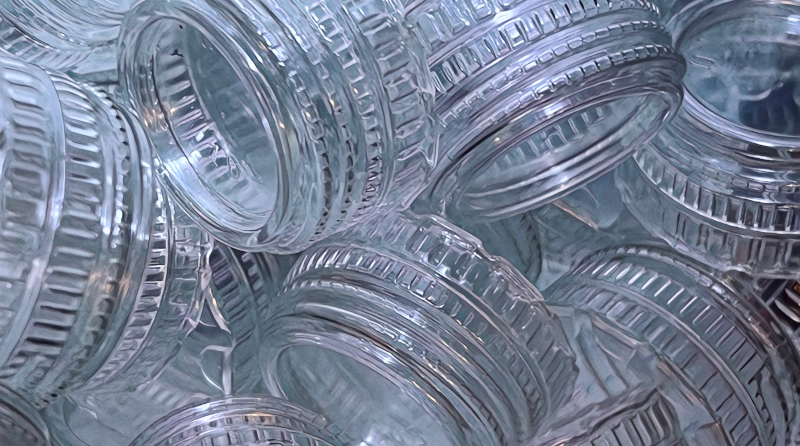PET closures for 1881 and beyond
Improving performance, enhancing sustainability
The Origin PET 1881 closure by Origin Materials introduces a versatile platform for producing rPET and PET closures, including tethered formats, across various industries. PET is not only the most recycled plastic in the world, today’s plastic recycling infrastructure is designed predominantly for PET. Closures made from PET could be transformative for packaging by designing for recycling circularity and improving the performance and sustainability of packaging.
Photo top: Origin PET 28 mm 1881 showing knurls
PET unlocks new design space
Within the packaging industry there is strong and growing demand for solutions offering superior performance and sustainability characteristics. This is especially true for products designed for circularity, enabling the re-use and recycling of materials, as opposed to waste and downcycling. Many food and beverage companies are committed to improving recycling, expanding the use of recycled PET, and improving the performance characteristics of their products while delivering an excellent consumer experience. Origin PET closures are claimed to introduce important advantages for delivering on these goals.
PET offers excellent barrier properties. Compared with other materials, this can result in less plastic needed to achieve equivalent or better performance. This can allow Origin to produce caps that can extend product shelf life, or produce the lightest caps of their kind, depending on the parameters optimised. Origin PET cap manufacturing does not require custom polymer, rather simply off-the shelf virgin or recycled PET, or blends thereof, depending on customer preference.

For aesthetics and consumer experience, Origin PET caps provide a fully transparent closure to enhance product visibility. The closures allow brands to tint, print, or emboss the closure for enhanced marketing. For tamper evidence, the company’s PET cap is designed to provide a satisfying user experience, from its feel to the sound it makes when opened.
The weight of the initial 1881 cap (1.5-1.8 g) is comparable or lighter than many HDPE or polypropylene caps on the market today. The light weight is afforded by the design space created by PET, with its good barrier properties – an estimated 40 times the carbon dioxide barrier, and 30 times the oxygen barrier of a similar thickness of HDPE – enabling new designs.
Better recycling with non-modified mono-materials
Mono-material products are made with one type of material. They are typically easier to recycle than products made from multiple materials and are highly desirable for packaging to improve recycling. For PET caps where the polymer is not modified, there is no need to separate caps from bottles during the recycling process to maintain the purity of the recycling stream, as there is with containers whose caps and bottles are made of different materials. This feature could be especially valuable for tethered cap solutions. In May 2024, Origin announced a tethered PET cap, which could become the first mass produced tethered PET closure.
Many beverage brands today make claims related to recyclability and use of recycled content but often must include caveats related to caps and labels. With PET closures, the use of 100% recycled content from cap to bottom becomes possible.
Manufacturing system
In September 2024, the company unveiled the Origin CapFormer System, its commercial-scale manufacturing system for the production of PET caps and closures, and announced the completion of its successful factory acceptance test. “Through the novel application of thermoforming, slit-and-fold technology, and proprietary design elements we have unlocked the ability to produce PET caps at commercial scale,” said Origin CEO and Founder Mr John Bissell.
The system has since produced caps for commercial customer qualification and has been delivered to Origin’s operations and manufacturing centre in Reed City, Michigan. There it will produce caps throughout 2025 and beyond. Additional CapFormer Systems are expected to come online during 2025 as part of commercial scale up.
Announced products, partnerships, and next steps
Initial products include the PCO 1881 compliant PET cap and a tethered PET cap, designed to comply with European cap tethering mandates and keep caps connected to bottles. In 2024, the company announced partnerships for the mass production of Origin PET closures with Bachmann Group for Europe and Reed City Group for North America, as well as strategic partnerships with IMDvista and PackSys Global for manufacturing.
Looking ahead, Origin expects to make PET caps in a wide variety of formats for not only beverages containers but food containers and others as well, reflecting the company’s mission to enable the world’s transition to sustainable materials. “The first Origin CapFormer System has already made several million PET caps using recycled PET plastic, and we’re just getting started,” said Bissell. “We expect Origin CapFormer Systems to produce caps not only for a diverse array of beverage bottles, but food packaging, medical products – the possibilities are extensive and incredibly exciting.”

